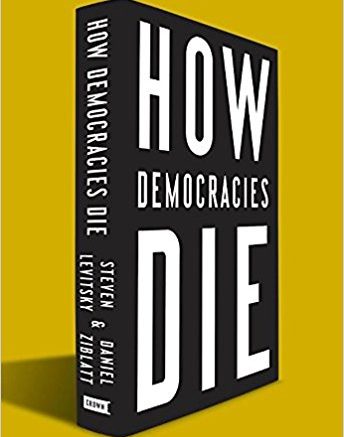“Put simply, political parties are democracy’s gatekeepers.”
“We know that extremist demagogues emerge from time to time in all societies, even in healthy democracies. The United States has had it share of them, including Henry Ford, Huey Long, Joseph McCarthy, and George Wallace. An essential test for democracies is not whether such figures emerge but whether political leaders, and especially political parties, work to prevent them from gaining power in the first place — by keeping them off the mainstream party tickets, refusing to endorse or align with them, and when necessary, making common cause with rivals in support of democratic candidates. Isolating popular extremists require political courage. But when fear, opportunism, or miscalculation lead established parties to bring extremists into the mainstream, democracy is imperiled.”
— Steven Levitsky & Daniel Ziblatt, “How Democracies Die”, 2018. (p.7)
By Mark L. Taylor
The Commoner Call (5/7/18)
I am about a third of the way into the recently published “How Democracies Die” by Steven Levitsky and Daniel Ziblatt, professors of government at Harvard University. For years they have independently and in collaboration studied the rise of authoritarian regimes out of democracies. In the process they have come to understand the danger signs and stumbling blocks that have led to the loss of democratic governments and the ways authoritarians of both the right and the left have been blocked from taking control.
Levitsky and Ziblatt call political parties the “gatekeepers” of democracies. It is their job to filter out the extremists and if an extremist does gain power it is their job to put aside temporary party interests and even align — if necessary — with other parties to block the rise of authoritarians.
If authoritarians are to be blocked from consuming political parties and leveraging that into the takeover of democratic governments, they must first be identified and called out for the existential threat they pose.
Drawing from the earlier work of political scientist Juan Linz, who was born in pre-Nazi Weimar Germany and raised in the midst of the Spanish civil war. Linz knew totalitarian threats to democratic rule from up close personal experience. Linz presented his research in his 1978 book “The Breakdown of Democratic Regimes”, which focused on the critical role of politicians and how their actions — or inactions — can either protect democracy or assist in destroying democracy when an authoritarian rises.
Levitsky and Ziblatt note that Linz “…proposed but never fully developed, a “litmus test” for identifying antidemocratic politicians.” They have drawn on Linz and developed a set of four behavioral warning signs that can help identify authoritarian politicians when they arise.
Here are the four warning signs of an authoritarian listed in “How Democracies Dies” (pp.21-22):
1.) Rejects in words or action, the democratic rules of the game;
2) Denies the legitimacy of opponents;
3) Tolerates or encourages violence, or;
4) Indicates a willingness to curtail civil liberties of opponents, including the media.
Sound familiar?
Clearly, all the warning signs were present with Trump from the moment he appeared on that gilded escalator to announce his candidacy. The republican party completely failed in their duty to block his rise.
Levitsky and Ziblatt note:
“A politician who meets even one of these criteria is cause for concern. What kind of candidates tend to test positive on a litmus test of authoritarianism? Very often, populist outsiders do. Populists are antiestablishment politicians — figures who, claiming to represent the voice of “the people,” wage war on what they depict as a corrupt and conspiratorial elite. Populists tend to deny the legitimacy of established parties, attacking them as undemocratic and even unpatriotic. They tell voters that the existing system is not really a democracy but instead has been hijacked, corrupted, or rigged by the elite. And they promise to bury that elite and return power to “the people.” This discourse should be taken seriously.” (p. 22)
Certainly, given the realities of the current American political system and leadership behavior of both political parties, the ground was fertile for Trump’s poisonous crop. This is why, if the democratic party is to have any chance of reversing what is now coming to pass in the nation, it must clean its own house and truly represent the needs of voters and provide an honest and honorable alternative to Trump and Russpublican authoritarian fascism.
Time is short and the work is great. Can the democratic party do what needs to be done? We better hope … and push them in the right direction.
In solidarity.


